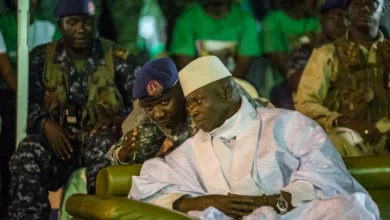News
NCCE to intensify public education on national issues in 2021

The National Commission for Civic Education (NCCE) has set 2021 to embark on well-thought-out citizen-centred programmes to actively engage Ghanaians on their civic rights and responsibilities as clearly specified in Article 233 of the 1992 Constitution of the Republic of Ghana.
For the year, the Commission is working with the theme, “We are one, Ghana First”.
This, the NCCE says was a carefully selected theme to remind the citizens of Ghana of the essence of togetherness and national cohesion for nation-building.
“After journeying through a keenly contested national election in 2020, it is only prudent that the Commission champions a national agenda of reviving patriotism, nationalism and political tolerance among the good people of Ghana”, NCCE said in a statement.
Per the release from the Commission, the year 2021 is poised to sensitize and actively engage citizens on the following areas of national interest:
The Commission will continue to rigorously reach out to young citizens in schools with its COVID-19 sensitization activities. The NCCE, within its limited resources, will design and distribute posters, flyers, stickers and other civic education materials to students to constantly alert pupils and students of the pandemic which remains a global health crisis.
Messages will be centred on the strict adherence to the COVID-19 safety protocols, de-stigmatisation among others. The Commission has commenced outdoor outreaches on the mandatory wearing of nose masks. This has been intensified following the rising number of COVID-19 cases in the country.
The NCCE will be seen on the streets, market centres, lorry stations and terminals engaging citizens on the need to adhere to the safety protocols.
Below are excerpts of the NCCE statement:
Public education on the introduction and administration of COVID-19 Vaccines in Ghana will be carried out in collaboration with the Ghana Medical Association.
Education on the role of MPs in our body politic has become a serious issue and priority to the Commission this year, especially when feedback from the public during the Commission’s 2020 voter education hinted that citizens are confused about the role Members of Parliament and District Assemblies.
The Commission through its sensitization strategies will actively engage citizens on the work and functions of MPs as well as target Members of Parliament for their active participation in this exercise when it kicks off.
With an election petition ongoing at the Supreme Court, it is only prudent that the NCCE educates the public to be politically tolerant throughout the election petition hearings and embrace peace, unity and ensure political cohesion after the final judgement is pronounced by the apex Court.
The Commission deems it necessary to educate the citizenry to accept the outcome of the judgement and respect decisions of the Supreme Court. By so doing, the country’s institutions will get the free space to discharge their duties.
The Judiciary remains a critical institution in our democracy and the NCCE is concerned about any damming utterances that seek to undermine the Judiciary. The Commission hence, seeks to actively engage the people of Ghana to respect the Rule of Law and uphold the integrity of the Judiciary, to strengthen the principles underpinning the 1992 Constitution.
The media in recent times have repeatedly recorded a number of assault cases among newsmen. Likewise, it has been accused of abusing their right to freedom of independence as enshrined in Article 162 of the 1992 Constitution of the Republic of Ghana.
The Commission, in line with this, is targeting both citizens and the media with its civic education engagements
to promote responsible journalism, respect for media freedoms and value the element of free speech that the 1992 Constitution of Ghana guarantees the people of Ghana.
Citizens will also be educated to appreciate the Constitutional mandate of the media and their role in consolidating Ghana’s democracy.
The NCCE is pleased to have received some support from the European Union and National Security to intensify public education on violent extremism along with border communities in Ghana. This public education is strategically targeted at regions and communities where there have been reported incidents of violent extremism activities.
Data Protection Commission and the NCCE will be educating the public on the Data Protection Act and related matters.
In spite of the singular responsibility entrusted the Commission to carry out civic education and programmes to sensitise citizens on the need to be responsible and always demonstrate patriotism, it is worth noting that Civic Education is a shared responsibility.
The NCCE charges all citizens to promote Civic Education in every sphere of life. These activities by the Commission will be rolled out nationwide and will be facilitated by Civic Educators across the length and breadth of the country. The Commission, however, hopes for timely release of funds for the NCCE to fully implement these citizen-centred programmes to stir up civic consciousness among the people of Ghana.
Source:Fiilafmonline/CitiNews



